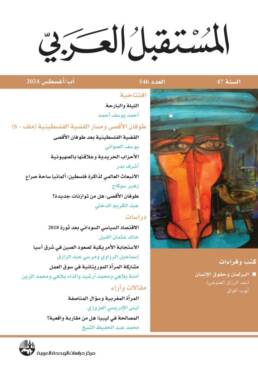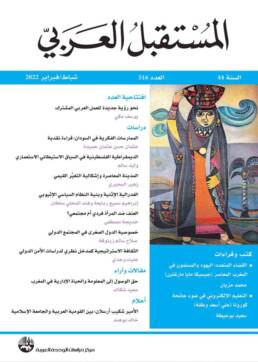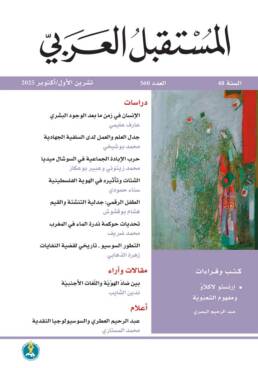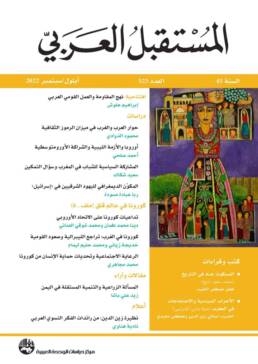The Al-Aqsa Flood and the Trajectory
of the Palestinian Cause (File – 4)
The Al-Aqsa Flood and the Dynamics of Transformation in the Strategic
Balance Equation …………………………….. Firas Abbas Hashem Majid 7
This study examines the areas of change generated by the “Al-Aqsa Flood” at both the internal and regional levels. It explores the role of the “Al-Aqsa Flood” in shedding light on the strength of Palestinian resistance and their military capabilities in penetrating the geography of “Gaza envelope” and creating a new balance equation in the Palestinian-Israeli conflict by changing the rules of engagement. Additionally, the study highlights the geopolitical interaction among confrontation arenas in the region, creating a conducive regional environment for confronting Israel. Furthermore, it presents evidence of current realities that encapsulate the challenges facing Palestinian resistance as a result of the costs incurred from military confrontations with Israel.
Keywords: Al-Aqsa Flood, resistance, Israel, strategic balance.
The Western Academy After the Flood:
The New McCarthyism ……………………………….. Hisham Safi al-Din 23
This study examines the paths and challenges confronting the pro-Palestinian solidarity movement in the Canadian Academy as a case study of the Western academy. The analysis is based on measuring a number of indicators. These include shifts in foreign policy or institutional decision-making and public opinion-making. Assessing the success or failure of these solidarity movements is best done at the level of academic politics rather than geopolitics in three regards: Sustainable reforms to curricula and methodologies used to approach the Palestinian cause, changes in the structure of administrations in favour of those supportive of Palestine, and boycott as well as divestment from Israel universities and organizations.
Keywords: McCarthyism, Academic Freedom, BDS, Zionist Lobby, Palestine Student Solidarity, Canada, Palestinian Exceptionalism, al-Aqsa Flood
The Al-Aqsa Flood: Racism in Western Philosophical Thought,
the Right of Philosophy to Depart ………………………… Aziz Al-Hilali 43
Western philosophy has established its major frameworks on conceptual pillars that allow the integration of the pure self into the values of truth and justice, while simultaneously trapping the ‘other’ in the quagmire of savagery and racism. This cycle, burdened with evil, has reached a level of moral exposure where even the poles of the Frankfurt School view the genocide being committed against the Palestinian people as a just and legitimate war. Faced with this tragedy, the departure of philosophy has become necessary in search of a geography that rebuilds the world according to fair universal values free from Western evil. Could the initiative taken by South Africa before the International Court of Justice for the sovereignty of universal justice be considered a signal falling within the framework of receiving philosophy over African lands?
Keywords: Harmony, racism, war, universality, justice.
The Genocide War in Gaza and the German Stance: Background of
Unconditional Support for Israel ………………….. Abdul Samad Fadel 63
Germany seeks to gain the approval of Israelis as much as possible, even if it means doing so on the ruins of a genocide being committed against the Palestinian people, exposing Germany’s contradiction as it tries to atone for its Nazi past by supporting “Semites”. This paper provides a narrative of the historical relationship between Germany and Israel, as Germany contributed to the establishment of the state of Israel and enabled it to possess the necessary power to maintain its existence. Germany has consistently sought to appease Israel, going so far as to link Germany’s existence to Israel’s security, without neglecting the influence of the United States in shaping this relationship between them as it stands today.
Keywords: Palestinian issue, Gaza, genocide, Germany, Israel
Studies
The Israeli Cultural War on Iraq on Social Media
After 2018 …………………………………………… Jasim Younis Al-Hariri 77
This study focuses on analyzing the Israeli cultural war on Iraq through social media after 2018. It examines the nature of this war, the methods and mechanisms used by Israel in it, and the repercussions and political, security, intelligence, and societal implications. The study presents two scenarios for the future of the Israeli cultural war on Iraq: a scenario of its continuation and a scenario of its retreat. The study concludes with several findings, most notably that the Israeli cultural war on Iraq has increased in effectiveness, especially after the Abraham Accords between Israel, the United Arab Emirates, and Bahrain in 2020, particularly as Iraq remains one of the few countries in the region that has not signed a peace agreement with Israel.
Keywords: Israel, cultural war, social media, Iraqi Jews, normalization.
The Authority of the Intellectual: What Societal Role Does
the Arab Intellectual Have Today? ……………………. Ahmed Moufleh 92
This study examines and discusses a set of problematic questions about the Arab intellectual today. Does he possess any tools of confrontation within his society? Does he have any authority, even among his compatriots, or a position, objective/material or subjective, among his people today amidst communication changes, digital revolution, information prevalence? Does the intellectual still maintain a presence in Arab societies amidst the competition of information dissemination through new, easy, and inexpensive tools, and the lack of concern for the accuracy of their content and impact? Ultimately, does this intellectual, who we have constructed a real and symbolic image of in our imagination and reality, still exist, or has he ended and died? Can the intellectual end with his various societal roles?
Keywords: Intellectual, Arab society, digital revolution, social media, information age.
The Narrative of the Libyan Crisis:
A Sociological Approach …………………. Mohamed Faraj Saleh Rahil 108
This study seeks to clarify the concept of “crisis” and investigate its descriptive capacity in light of events and developments on the Libyan scene. It aims to provide a clearer understanding of this concept and proposes theoretical approaches to understand the Libyan crisis and test its current and future effects, including traditional and non-traditional approaches such as the Marxist conflict approach, the organic functional approach, and Edgar Morin’s crisis science approach. One of the main concerns of this paper is considering the Libyan crisis as interconnected stages through a long chronological sequence. This attempt represents an implicit approach to unraveling the Libyan situation, albeit not in-depth, considering the nature of complexity and branching that the Libyan crisis suffers from.
Keywords: Narrative of crisis, sociological approach, Libyan society.
Articles and Opinions:
Religion and Secularism: Perspectives on Contradiction
and Integration ……………………………………………. Mokhles Al-Sabti 123
The Triangular Co-operation in Moroccan International practice
(Morocco – China – Africa) ……………………………….. Ismail Razaoui 131
The Presence of the Novel in Philosophical Thought in Morocco:
Abdullah Al-Arwi as an Example through
the Novel ‘Al-Fariq” ……………………………………. Soufiane Al-Baraq 140
Books and Readings
Syria the Strength of an Idea: The Constitutional Architectures
of its Political Regimes (Karim Al-Attasi)……………………… Ali Shukr 148
The Cultural Issue in Algeria: Elites, Identity, Language, a Critical
Historical Study (Nasser Eddin Saeedoni)……… Nour Al-Din Thaniou 152
Books Summaries……………………………………………………………….. 160
Arabic Books: Variables and Becoming: Insights into the Facts of a Changing World; Artificial Intelligence: Reality and Challenges; Constraints and Incentives: Wars in the Middle East; Diaries of the Al-Aqsa Flood Battle and Israeli Aggression on the Gaza Strip: October 7th, 2023 – March 31st, 2024
Foreign Books: Russia and Iran: Partners in Defiance from Syria to Ukraine; The Crisis of Culture: Identity Politics and the Dominion of Norms; Revitalizing the United Nations; The Formation of the UAE: State-Building and Arab Nationalism in the Middle East
Research Reports: Egypt’s Dilemmas Regarding Gaza; President’s Death in Crash Unlikely to Impact Iranian Policies.
Add a review
You must be logged in to post a review.








